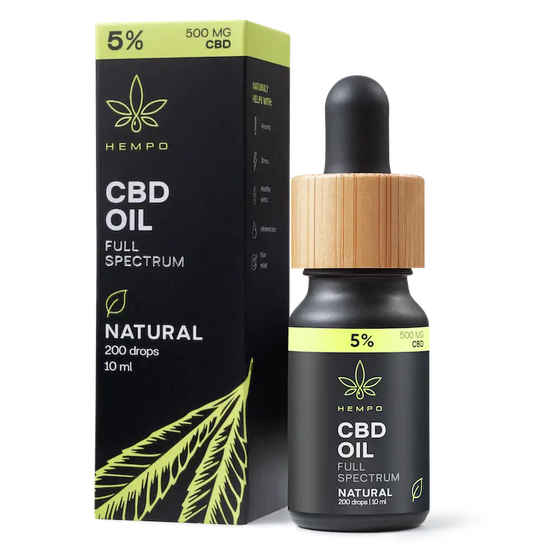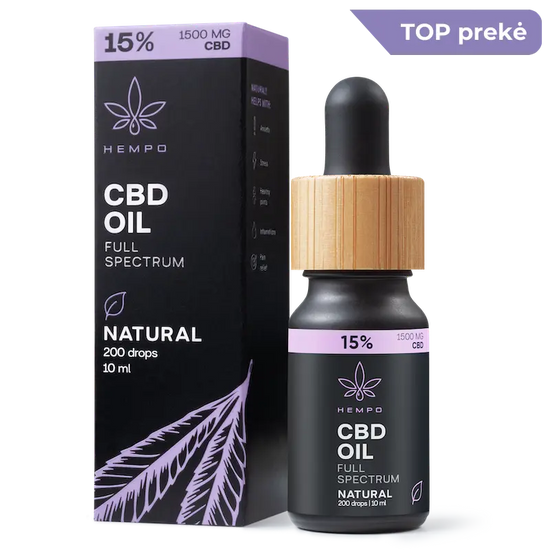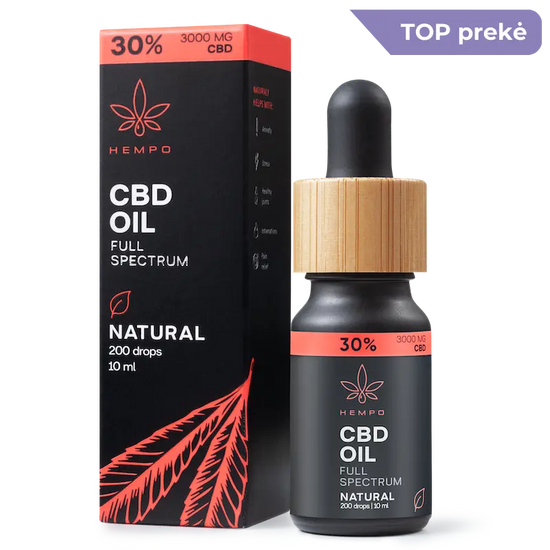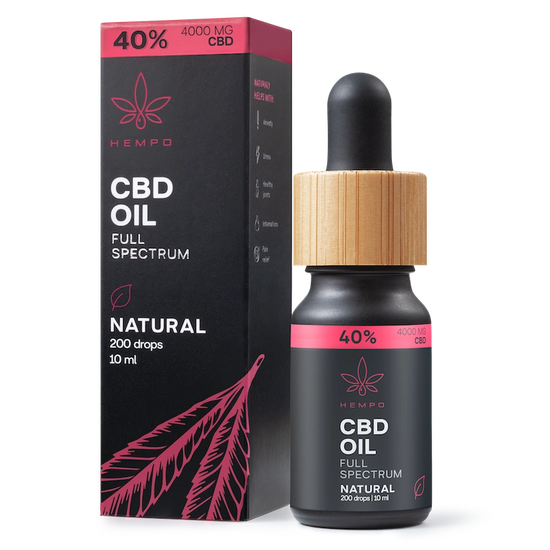Full spectrum CBD and the entourage effect
Hemp plants are known to contain 100 different phycocannabinoids, which are natural chemical compounds of plant origin. Many have probably heard about their benefits over the past year. Once in the body, these compounds affect the CB1 and CB2 receptors in your endocannabinoid system (ECS), which maintain the balance and optimal functioning of various body functions.
Cannabidiol (CBD) and tetrahydrocannabinol (THC) are the two most popular phycocannabinoids with the highest concentration in the hemp plant. They determine the psychological and physical effects of hemp.
The adverse effects of THC in the form of psychoactive properties are often discussed around the world. As a result, many people are very wary of this cannabinoid and the hemp plant. However, a lot of research and experience show that full-spectrum CBD oil, which contains a minimal but permitted amount of THC, which is 0.02%, does not cause any psychoactive effect or addiction. On the contrary, it works in synergy, significantly enhancing the effectiveness of CBD. This phenomenon is called the entourage effect. It's the main reason why full-spectrum CBD products are considered much more effective than CBD isolate, a formula free of all related cannabinoids, except for CBD.
Here is what you need to know.
Table of Contents
Note: This and other articles on Hempo's blog are for informational purposes only. According to the directive of the European Commission, cannabidiol is classified as a 'novel food', therefore CBD products should not be used as a food supplement in Lithuania.

What is Cannabidiol?
What is Full-Spectrum CBD Oil?
One of the key aspects of full-spectrum CBD is that the products contain a comprehensive profile of beneficial cannabinoids. Unlike CBD isolate, full-spectrum CBD includes various cannabinoids like CBD, CBG, CBN, and trace amounts of THC. This mixture of beneficial cannabinoids is believed to enhance the overall therapeutic benefits of CBD, contributing to its commonly cited advantages, such as potential pain relief and anxiety reduction.
When considering full-spectrum CBD products, it is essential to understand the complex interaction between cannabinoids and terpenes. Each component in the product contributes to its effectiveness, making full-spectrum CBD the preferred choice for those seeking a potent, natural, and genuinely beneficial health solution. Remember, the full-spectrum CBD and the entourage effect are what make these products stand out from other less effective types of CBD.
What is the entourage effect?
The entourage effect is a phenomenon where the cannabinoids in CBD oil (CBC, CBN, CBG, THC, etc.) work together to enhance the effectiveness and effect of CBD, which is significantly greater than when taken alone.
Scientific studies have found that full-spectrum CBD oil, which contains all the cannabinoids listed above, has a significantly better effect compared to CBD isolate.
How does it work? The entourage effect is a phenomenon where phytocannabinoids found in hemp act in synergy and modulate the overall effect of the extract obtained from the plant.
The entourage effect is not only between THC and CBD, because, as we mentioned before, hemp has more different types of cannabinoids with unique properties. Although CBD is the most popular cannabinoid with many positive properties, its benefits can be enhanced by using other cannabinoids.
Examples of the CBD entourage effect
Now that you are familiar with the entourage effect, let's take a look at what science has to say about this intriguing phenomenon.
A 2018 meta- analysis found that 71% of patients reported greater effects when they took CBD extracts mixed with other cannabinoids and terpenes, while only 46% reported similar effects with pure CBD.
The study adds that one of the most significant observations is the difference in the average daily dose between pure CBD and full-spectrum CBD. It turned out that the average daily dose of full-spectrum CBD was four times lower than the average daily dose of pure CBD. It means that CBD extract mixed with other cannabinoids is four times stronger than pure CBD.
In 2011, a research review was published by the British Journal of Pharmacology that looked at terpenes - another psytotherapeutic substance in hemp.
Terpenes not only give the plant its unique aroma, but also work in synergy with cannabinoids to enhance the entourage effect. They can relieve physical discomfort, help overcome mental problems and improve general well-being.
We mentioned earlier in the article that cannabinoids can also moderate each other's side effects. The same 2011 review found that CBD completely reversed the side effects of THC, including anxiety, dizziness and feeling of hunger. It should be noted that this review used a significantly higher than permitted level of THC, so if you use full-spectrum CBD oil with a permitted level of 0.2% THC, the side effects above would not occur in any case.
Terpenes and flavonoids can help brain function and more
Terpenes are also thought to help increase the effectiveness of psytocannabinoids. But what exactly are those terpenes?
Terpenes are essential oils with unique aromas found in almost every plant on earth. In other words, terpenes determine how you smell a plant.
When it comes to hemp plants, their properties are often determined by the concentration of terpenes they contain. Studies show that terpenes have a wide range of health benefits, including for physical and mental health.
There is also a group of phytonutrients called flavonoids. They can be found in a variety of fruits, flowers, vegetables and even hemp and hemp plants. Their main purpose is to act as cell messengers and provide plants with pigment. When it comes to hemp, its main flavonoids are called cannapoflavins.
The 2011 review found that there was a significant increase in interest in flavonoid research because of their benefits to human health, as reported by some epidemiological studies. It also suggested that flavonoids had many beneficial properties, including anti-inflammatory, antioxidant and neuroprotective. Since then, studies have proven that flavonoids have many positive properties for human health and well-being.
Other research suggests that CBD, along with certain phytochemicals such as terpenes and flavonoids, may benefit brain function. They have shown cognitive, neuroprotective and anti-inflammatory effects in cases of cerebral ischemia and neurodegenerative disorders.

Full-spectrum CBD vs. CBD isolate: which is better?
As you know now, full-spectrum CBD products have the entourage effect. They contain all naturally occurring cannabinoids, terpenes and a small amount of THC (no more than 0.2%).
CBD isolate is pure CBD, separated from other hemp compounds, so it does not have the entourage effect. However, it may be the best choice for nursing mothers or professional athletes for whom doctors recommend avoiding the THC cannabinoid altogether.
When it comes to the health benefits of CBD oil, full-spectrum products provide more effective results than other types of extract. CBD isolate, in turn, is better suited for people who are allergic to certain hemp compounds and, as we mentioned, for nursing mothers and professional athletes.
Even so, you will still experience the effects of CBD isolate, but they will not be as strong as with full-spectrum CBD oil.
It has come to attention that CBD products available on the Lithuanian market are often labelled as full spectrum, but after checking the lab results it turns out that the products contain only a few cannabinoids, e.g. CBD and CBG. Therefore, when choosing full-spectrum CBD products, make sure to check their lab results and that they contain all the main cannabinoids (CBD, CBD, CBN, CBG and the permitted content of THC).
Learn more: ' Types of CBD oil and their differences'.
Not All CBD Products Are the Same
Is CBD as Effective Without THC?
The discussion about THC and CBD further complicates the question of whether CBD is as effective without THC. Consumers who want to experience the benefits of CBD without any contact with THC often choose CBD without THC. The effectiveness of cannabinoids remains high in this case, although the benefits provided by full-spectrum CBD and the entourage effect are incomparably greater.
Moreover, it's important to note that the entourage effect caused by full-spectrum CBD is not solely due to the THC compound. It is a complex process where all the cannabinoids present in full-spectrum CBD products work together and can offer greater therapeutic benefits than pure CBD. Thus, although non-psychoactive CBD is effective, its effect can slightly differ from that provided by full-spectrum CBD products, which often contain a minimal, allowable amount of THC.
In summary, CBD without THC is beneficial, but it is not as effective as full-spectrum CBD products. It is important to pay attention to this, especially for individuals seeking to understand the nuances of cannabinoid effectiveness and the dynamics between THC and CBD.
Full spectrum CBD and the entourage effect: final thoughts
Cannabidiol (CBD) has many health and wellness benefits on its own, but extensive research shows that its effectiveness is significantly greater when the product contains the full range of beneficial cannabinoids, such as CBC, CBN, CBG and THC.
The entourage effect also means that a smaller amount of CBD is enough to achieve the desired results, as its effectiveness will be enhanced by other hemp compounds (cannabinoids), terpenes and flavonoids.





